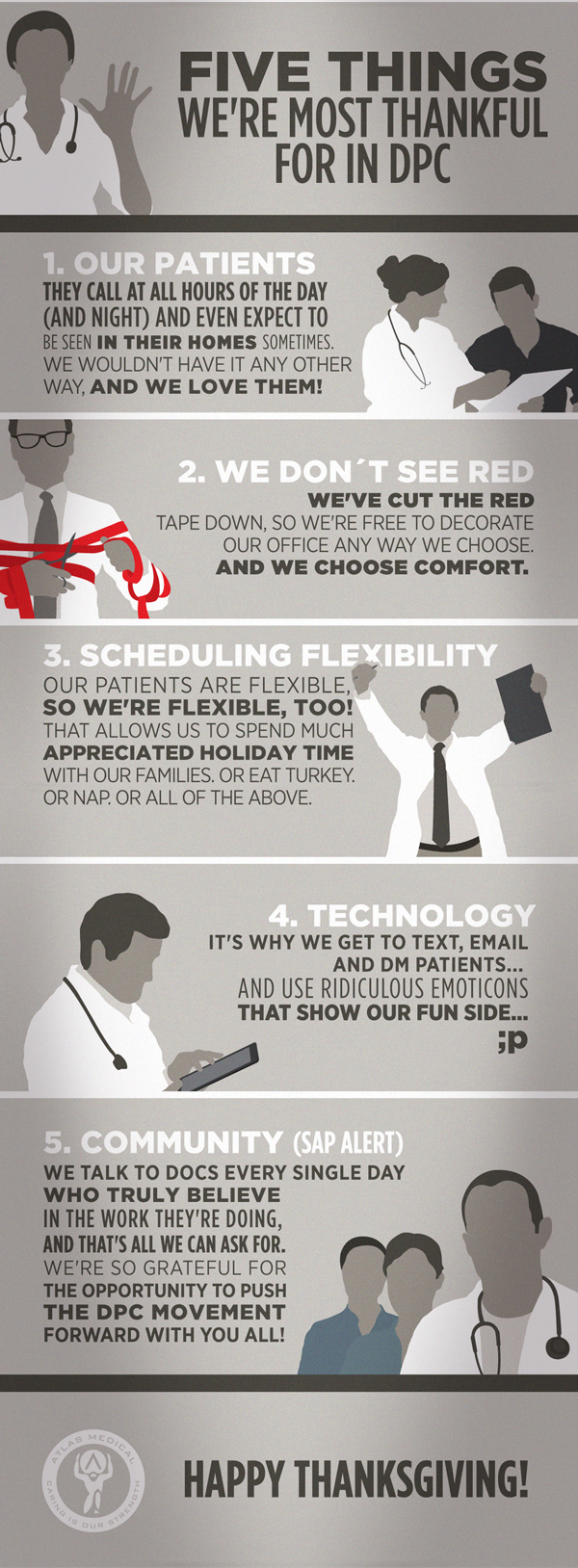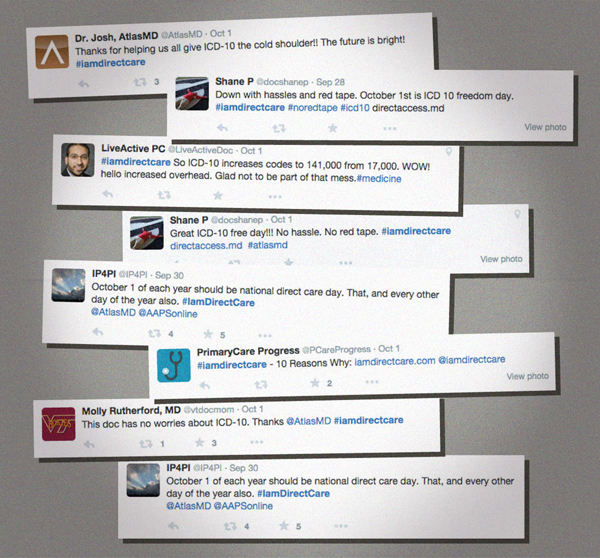 |
|
While all doctors can benefit from malpractice insurance, it’s rare to find a company that offers insurance specific to your clinic’s needs. But we set out to change all that. We’ve been working closely with a national malpractice carrier to give DPC clinics a discount. With the support of Atlas, the Cunningham Group has negotiated for an exclusive medical malpractice insurance program with an A-rated medical malpractice insurance company. In our own practice, we saved a total of $13K a year by working with the Cunningham Group. When you sign up for discounted malpractice insurance with the Cunningham Group, you can expect the following:
By receiving insurance through Cunningham, you’ll work with a company that is dedicated to serving your unique needs as a DPC practitioner. You’ll also work with a program dedicated to bringing DPC and concierge care into the mainstream. Once patients and business owners start to see that DPC and concierge care are very real and are a beneficial alternative to traditional practices, they’ll be more likely to participate in a DPC program. When you’re ready to save money on your medical malpractice insurance, or if you have any questions about your options, check out the Cunningham Group today. |
Category Archives: I Am Direct Care
Save 40% on Insurance
The Virtual Quality Myth. How DPC Changes the Game.
Quality seems good, right? Quality seems the like thing that we’re all after, right? Well, sort of! When it comes to EMRs, we’re on the right track. While the rest of the EMRs are tripping over themselves to comply with government regulations over quality, we’re able to pursue actual quality medicine above all.
It turns out that what has been a speculation for years (that government regulations distort quality by making overtesting and distortion of informed consent and overmedication – to name a few – a regular part of a doctor’s work day), has been proven to be a pervasive and perverse issue in the medical world, according to PLOS Medicine.
Virtual Quality Doesn’t Promote Health
This phenomenon is so common that it has a name — “virtual quality,” and it relates to the fact that applying rigid standards, regulations and “guidelines” might make sense statistically but they don’t actually apply to patients, and these rigid guidelines can actually produce harmful effects on patients. It seems counterproductive because it is. The whole point of guidelines should be to ensure a positive standard of practice, but the reality is that guidelines and PQRS’s actually reduce patient quality. According to Peter C. Cook, M.D.,
The notion that PQRS promotes quality care rests on the flawed assumption that a bloated federal bureaucracy, CMS, can be nimble enough to produce quality measures that keep up with the rapidly evolving state of scientific evidence. Reality contradicts that assumption. Published reviews in JAMA have determined that ‘most guidelines become outdated after 5 years.’ (Medical Economics)
Return to True Quality Care
And if that wasn’t enough to make you change your mind, consider the study published in PLOS Medicine, Quality Care that Matters, which states that the “current quality measures should be abandoned.” Obviously “quality measures should reflect meaningful health outcomes. Surrogate measures do not satisfy this principle. Clinical trial results are often not attained in the real world, and there should be evidence that quality measures do, in fact, substantially improve health outcomes across various locales and practice settings.”
DPCs Make a Real Difference
While this is bad news for standard medicine, it’s good news to all of the doctors and patients who subscribe to DPC. We believe in actual quality, not virtual quality, and that’s more meaningful to us than “Meaningful Use” could ever be!
When you’re ready to take the next step in starting your DPC practice, take a look at our curriculum to see how you can get started.
Proud to Work on Christmas.
It’s Christmas Day, and pretty much everyone you know is spending time with family and friends. They’re opening presents, attending a church service, sledding, and lounging by the fire after another giant meal. But you experience holidays a little differently. You’re hanging with your family and partaking in all the usual holiday traditions, sure. But you’ve had one eye on your phone all day, and not because you’re a social media addict.
You see, as Jack was opening presents he sliced his finger open with the scissors. Rather than spending the rest of the day sitting in the ER and stressing over the money that would have cost, he called you. You met him at your office and stitched him up – in just a few minutes, and for just a few bucks. He left with a big smile on his face; an hour later he sent you a picture of his young son sailing down the hill on his new sled for the very first time. His text said he’d have missed that moment if it weren’t for your quick action and availability.
Across town, Jill was shuffling her family into the car on the way to brunch when she slipped on the ice. Her ankle swelled up in a hurry, but not before she punched in your phone number. After walking her though a verbal questionnaire about her symptoms and the severity of the fall, you were able to determine it was just a sprain and that some Ibuprofen would do the trick. Jill let her husband take over the shuffling, and while kicking her feet up after brunch as you instructed, she and her daughter had a fantastic conversation that might not have happened if Jill had been ultra-mobile as usual.
In the Swinkle home, Grandpa Bob snuck into the pantry and devoured the rest of the jalapeño sausage… which gave him instant heartburn. When he confessed to his thievery, his daughter called you immediately to make sure the heartburn relief pill she planned on giving him wouldn’t interfere with his other medications. You reviewed his chart, did some cross referencing, and advised her to stay away from that particular heartburn relief pill. Instead, you recommended one that wouldn’t interfere with his existing med list – saving him a trip to the hospital later, and possibly even his life.
So yes, you are a teeny bit distracted today. But you’re grateful for the chance to care for your patients. Thankful for their trust. You might get a few calls on Christmas that pull you away from the holiday task at hand, but you wouldn’t have it any other way. They’re family, too. Your patients needed you, and because you truly understand the value of Direct Care, you were there for them today. Today and every day.
Merry Christmas to all you Direct Primary Care warriors. May you be ever reminded of the value you offer your patients, the medical community, and society as a whole.
Is Your Clinic Holiday-Ready?
The holidays are right around the corner. You know that, right? We’re talking days away. Days.
Even if you completely forgot to send out Christmas cards (no judgement here!), don’t panic — there’s still time to get your DPC practice holiday-ready. Here are three simple ways you can communicate your holiday plan to your patients — keeping them in the loop, and you transparent. When everyone knows what’s going on, everyone wins.
List your holiday hours on your website.
It’s the first place your patients will go to investigate your schedule. So hop on over to your contact page and take a minute or two to update the content. Mentioning something on your blog (if you have one) wouldn’t hurt, either.
Send out an email!
It’s such a simple thing, but your patients will appreciate it more than you know. Doesn’t have to be long, or too terribly eloquent. Just be nice, wish them well this holiday season and be sure to let them know how to reach you if that method has changed from the usual. (If you use the Atlas.md EMR, freshen up on how to send an email from inside the EMR here, or using a third party here.)
Update your voicemail message.
They will call, but you won’t always be able to answer. When that happens, make sure your holiday hours are plainly stated in your voicemail message. Because if for some reason you’ll be unavailable for an extended period of time, your patients won’t waste their time calling, texting, emailing, and calling again.
So, there you go. Won’t take more than a few minutes of your time, and the result is that your patients know you have your stuff together. Oh, and there might still be time for Christmas cards! Shutterfly will even mail them for you…
Introducing Direct Career Placement on IAmDirectCare.com.
You’re only as strong as the team surrounding you, right? Well in that case, let’s give you an advantage over all the rest! Introducing Direct Career Placement, where IAmDirectCare.com helps connect you with the DPC family that’s right for you. Because let’s face it – a brighter future is right around the corner with Direct Care. Who does Direct Career Placement apply to? So glad you asked.
Is your practice looking to add a team member?
That’s great, congratulations! You’re probably talking around, getting a feel for who’s interested. After all, choosing the right addition to your team is a decision not to be taken lightly. So why not choose from a pool of candidates who are already actively interested in Direct Care? They know what it’s about and want to join your team. They’re individuals who are qualified and can’t wait to start their career with you providing excellent patient care using the Direct Care model. Take advantage of existing DPC connections by submitting your practice information on IAmDirectCare.com – interested individuals will be able to contact you directly. You can reach out to listed individuals, too! (Bonus: when you submit your listing you’ll even receive a unique URL you can share via social media to get the word out even further.)
Are you an individual looking for a DPC family of your own?
Also fantastic! If you’re transitioning out of the traditional healthcare setting, or even transitioning out of residency, you might already know for sure Direct Care is perfect for you. Read more
Three Ways Your Direct Care Practice Can Tell A Better Story. Part Two: Branding Speaks Volumes.
 In part one of this three-part storytelling series we talked about how literally every action you take plays a role in the story you’re telling your patients. What you do matters — even little stuff like saying thank you, responding to emails, and having a friendly face or voice to greet your patients can send a powerful message. And that’s a message you don’t want your patients to interpret on their own!
In part one of this three-part storytelling series we talked about how literally every action you take plays a role in the story you’re telling your patients. What you do matters — even little stuff like saying thank you, responding to emails, and having a friendly face or voice to greet your patients can send a powerful message. And that’s a message you don’t want your patients to interpret on their own!
But your actions are only one part of the equation. To tell a complete story you also have to think about what your patients see when you’re not there. That’s right – we’re talking about branding.
It’s the website. It’s the brochure. It’s the business card. It’s the content of your blog, emails and texts. In one single word, it’s your identity. Good stuff, huh? Let’s talk about how you can use these branding elements to breathe life into your story and convey the real message of DPC.
One Voice
Throughout all the materials mentioned above (website, brochure, business card, content, etc.) it’s important to have one underlying theme peeking through. Is it that you’re available 24/7? Is it that you always put your patients first? Do you have a tagline you can weave in? When patients see the same message on various materials it does a couple good things: it tells them you’re put-together, and it engrains your message into their heads. Rather than just another doctor’s office, they come to identify you as the people who provide care.
So in a nutshell, what you’re trying to avoid here is sending mixed messages. If there was only one thing you could tell your patients, what would it be? Now make sure that comes across in each piece.
Visual Storytelling: Design
Small design elements can translate really well across different pieces — and go a long way toward telling a cohesive story. Let’s start with your logo. Read more
Three Ways Your Direct Care Practice Can Tell A Better Story. Part One: What You Do Matters.
 As a Direct Care practitioner, you’re doing so much more than practicing medicine. You’re telling one of the most important stories our country, and perhaps the world, needs to hear today. You’re telling the story of happiness. Of freedom. Of satisfaction. Of care.
As a Direct Care practitioner, you’re doing so much more than practicing medicine. You’re telling one of the most important stories our country, and perhaps the world, needs to hear today. You’re telling the story of happiness. Of freedom. Of satisfaction. Of care.
Your story paints a picture for healthcare patients. This picture isn’t abstract nor is it intangible. It’s vivid with color, the depth of its honesty and transparency reaching into their souls and telling them that better is possible.
In this three-part series, we’ll dig deep into some ways you can step outside your medical mindset and tell your patients a more engaging story. In return, they’ll keep coming back and sing your praises to
What you do matters.
Every interaction you have with your patients tells the story of what healthcare should look like. In it’s simplest form, this step is just about taking advantage of the foundation Direct Care was built on. It’s sticking to your word and putting your patients first in the following ways:
If you offer same day scheduling, make it happen.
Remember, your patients are probably used to waiting three weeks for an appointment, spending an hour in the waiting room, and then being shuffled right back out the door 10 minutes later. You can show them they don’t have to put up with that nonsense for another minute.
Respond in a timely fashion.
You’ve chosen to keep a limited patient count in order to make time for everyone. So since you don’t have back to back to back appointments scheduled 15 minutes apart, you likely have some form of downtime throughout your day. Use it to keep on top of patient correspondence. You might have six patients to deal with in one day, but they’re only concerned with one doctor… they want to know they’re just as important to you as you are to them. A simple response can go a long way to prove that.
Staff your office appropriately.
You don’t need a whole crew of people to man your DPC practice. You might be the only physician in it! But if you’re behind closed doors with a patient, who’s manning the front desk? The phones? Read more
The New ICD Billing Codes Have Launched… But We’re Still Celebrating!
Some establishments are still scrambling to make ICD ends meet. Some are just trying to recover from the bumps in the road uncovered during the October 1 launch. But Direct Care practices around the country reported smooth sailing so far – and even had some time to show off their support for DPC!
We’ll continue to celebrate freedom from red tape and billing codes – you can, too! We’re still offering #IAmDirectCare T-shirts so you can wear your support all year round. We even heard some patients wanted shirts! Now that’s a party. Get yours over here, and see how Direct Care looks on you!
Cheers to happy docs and happy patients.
The Pen and Paper Era was Accident Prone. How is Medical Tech Better?
“A study from the pen-and-paper era showed that 1 in 15 hospitalized patients suffered from an adverse drug event, often due to medication errors. A 2010 study (using data collected during the pre-digital era) estimated the yearly cost of medication errors in U.S. hospitals at $21 billion.” – Medium.com
Whoa.
When you look at those stats, it’s no wonder the industry couldn’t wait for a better way. Technology has done so much good in the way of standardization and reducing the margin of human errors. EMRs and the like have made it easier for docs to spend less time charting and more time actually with their patients. The benefits far outweigh any negatives, but that’s only if you use technology responsibly.
We can’t leave our jobs totally up to technology, as the story over on Medium.com illustrates perfectly. If we do, we’ll miss things like a massive accidental overdose (patient needed one pill, got 39 instead) and nobody wants to feel the guilt Nurse Levitt experienced so intensely. We’ll miss dangerous drug interaction warnings and potential allergy notifications. We’ll miss the opportunity to avoid life-threatening situations. Whether we’re in a hospital setting, or a clinic setting, this kind of attention to detail still matters. Immensely.
We know this. And we, as Direct Care professionals, have adopted a business model that wholeheartedly embraces the very two things that can prevent errors like this from happening — even in the technology era.
1. We’ve gotten rid of red tape and policy that does nothing but convolute the simplest of tasks. In fact, we’ve taken it upon ourselves to build the EMR that we want, and have thus turned it into a product incredibly useful for hundreds of other Direct Care practices, too. It’s based on accuracy, simplicity and ease of use. There are people working around the clock to make sure these things work together in tandem.
2. We have time. Time to think through every prescription we order and dispense. Time to double check dosage. Time to actually pay attention to the alerts that fire when an irregularity has been electronically recognized. This gift is not something we take lightly.
Technology can certainly make our jobs — our lives — easier and more efficient. For that we’re thankful on a daily basis. But we mustn’t forget that we are the threshold for which all medical decisions must pass. We can’t check common sense at the door in lieu of an app that thinks for us. And because we have a business model that allows us to work to the best of our abilities, we love our jobs… and therefore don’t want to just go through the motions.
So thanks to technology, for all you do for us. But more importantly, thanks to Direct Care, for existing so that we may also operate as the best versions of ourselves.






